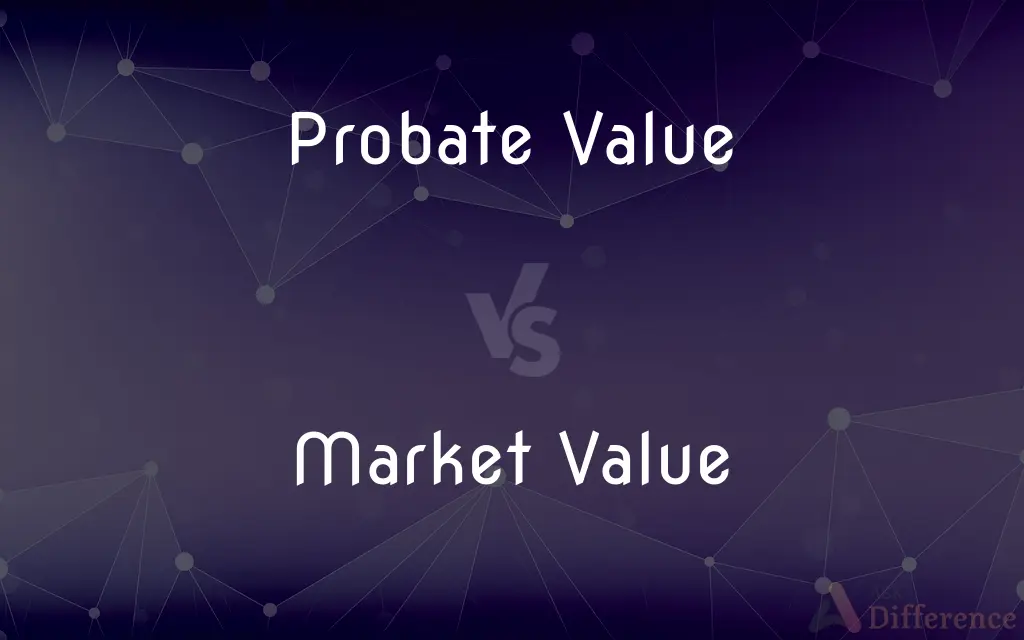Probate Value vs. Market Value — What's the Difference?
By Maham Liaqat & Urooj Arif — Published on July 9, 2024
Probate value refers to the worth of a deceased person's estate for legal purposes, often assessed conservatively, while market value is the price a property might fetch if sold on the open market, reflecting current economic conditions.

Difference Between Probate Value and Market Value
Table of Contents
ADVERTISEMENT
Key Differences
Probate value is determined during the probate process, which is the legal procedure for settling a deceased person's estate. This value is used to calculate any owed inheritance tax and must be approved by tax authorities. Market value, on the other hand, represents the estimated amount that a property would sell for under current market conditions, taking into account factors like location, condition, and demand.
The assessment of probate value is often more conservative than market value. This is because probate value aims to meet legal and tax requirements, focusing on a fair valuation for tax purposes rather than potential sale price. Market value is influenced by what buyers are willing to pay, which can fluctuate based on economic factors, trends, and property desirability.
Probate value is crucial for the legal distribution of an estate, impacting how assets are divided among heirs and the calculation of inheritance taxes. Market value is important for sellers, buyers, and real estate professionals, guiding the listing price of properties and negotiation strategies.
The process of determining probate value usually involves appraisal professionals who assess the value of property at the time of the owner's death. Market value assessments, while they can also use appraisals, more directly involve real estate agents and comparative market analysis to reflect active market conditions.
Differences in these values can lead to distinct outcomes for beneficiaries and potential buyers. For instance, a higher market value can be advantageous for heirs if they intend to sell the property, whereas a lower probate value can reduce inheritance tax liabilities.
ADVERTISEMENT
Comparison Chart
Purpose
For legal assessment of an estate's worth
For estimating a property's sale price
Use in
Probate process, inheritance tax calculation
Real estate listings, sales negotiations
Basis of Assessment
Conservative, focusing on a fair valuation for tax purposes
Reflective of current market conditions and buyer interest
Influenced by
Condition of the property at owner's death, legal requirements
Economic factors, property location and condition, demand
Determined by
Appraisals for tax purposes
Real estate agents, comparative market analysis, appraisals
Impact
Affects inheritance distribution and tax liabilities
Influences listing prices and investment decisions
Fluctuation
Less subject to rapid changes
Can fluctuate widely with market conditions
Compare with Definitions
Probate Value
Usually determined by professional appraisers.
An appraiser was hired to assess the probate value of the deceased’s property.
Market Value
The estimated price a property could sell for on the open market.
The market value of the home was higher due to its desirable location.
Probate Value
Important for the equitable distribution of an estate.
Beneficiaries received shares based on the probate value of assets.
Market Value
Subject to fluctuation with market trends.
Market value dipped following a downturn in the local economy.
Probate Value
The value of a deceased person's estate for legal and tax purposes.
The probate value of the estate was determined to calculate the inheritance tax.
Market Value
Can be influenced by a property’s location, condition, and features.
The newly renovated kitchen significantly increased the home's market value.
Probate Value
Affects the calculation of inheritance taxes.
A lower probate value meant the estate owed less in taxes.
Market Value
Reflects current economic conditions and buyer demand.
Rising demand in the area boosted the property’s market value.
Probate Value
Assessed conservatively to meet tax authority requirements.
The house’s probate value was set lower to reflect its state at the owner's death.
Market Value
Used to guide real estate listings and sales.
The seller listed the house above its market value, expecting negotiations.
Common Curiosities
How often is market value assessed compared to probate value?
Market value can be assessed anytime a property is considered for sale or refinancing, while probate value is specifically assessed at the time of the owner’s death.
Is market value important in the probate process?
Market value is not directly used in probate but can inform beneficiaries about the potential sale price if they choose to sell the estate’s property.
Can improvements made after an owner's death affect probate value?
No, probate value is based on the property’s condition at the owner's death; improvements afterward affect market value, not probate value.
How can market trends impact both values?
Market trends can impact the market value directly and might influence probate value indirectly through comparative assessments or if the property is sold shortly before or after the owner's death.
Can market value affect probate value?
While separate, market conditions can indirectly influence probate valuations, especially if a recent sale of the property provides a benchmark.
Who determines the probate value of a property?
Professional appraisers or valuation experts, commissioned during the probate process, usually determine probate value.
Why is probate value often lower than market value?
Probate value is assessed conservatively for tax purposes, focusing on a fair valuation rather than potential sale prices, which can make it lower than the market value.
What role does a real estate agent play in determining market value?
Agents use comparative market analysis and their knowledge of local trends to suggest a market value for listing purposes.
What happens if there's a significant difference between probate and market values?
A significant difference might affect beneficiaries' decisions on selling or holding assets, and in some cases, might require a reevaluation for tax purposes.
Do all assets in an estate require a probate value assessment?
Yes, most assets need a probate value for tax and distribution purposes, although the level of detail required can vary.
Share Your Discovery

Previous Comparison
Periods vs. Groups
Next Comparison
Angery vs. AngerAuthor Spotlight
Written by
Maham LiaqatCo-written by
Urooj ArifUrooj is a skilled content writer at Ask Difference, known for her exceptional ability to simplify complex topics into engaging and informative content. With a passion for research and a flair for clear, concise writing, she consistently delivers articles that resonate with our diverse audience.













































